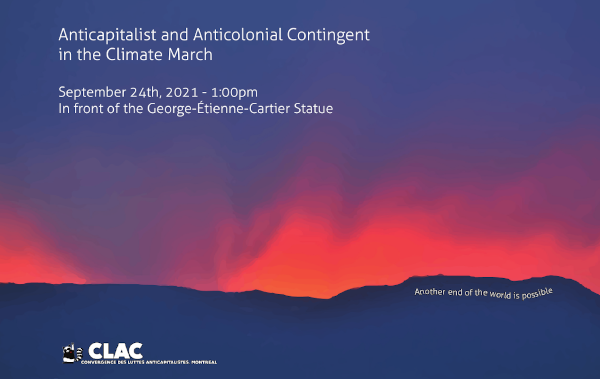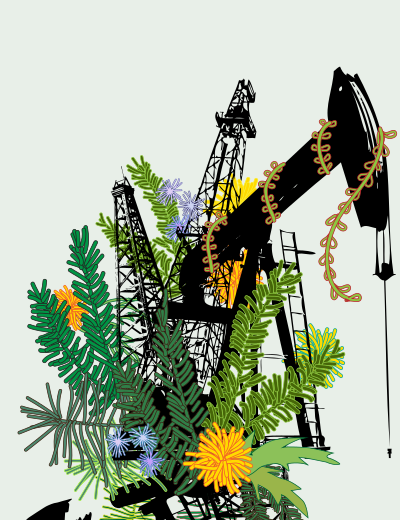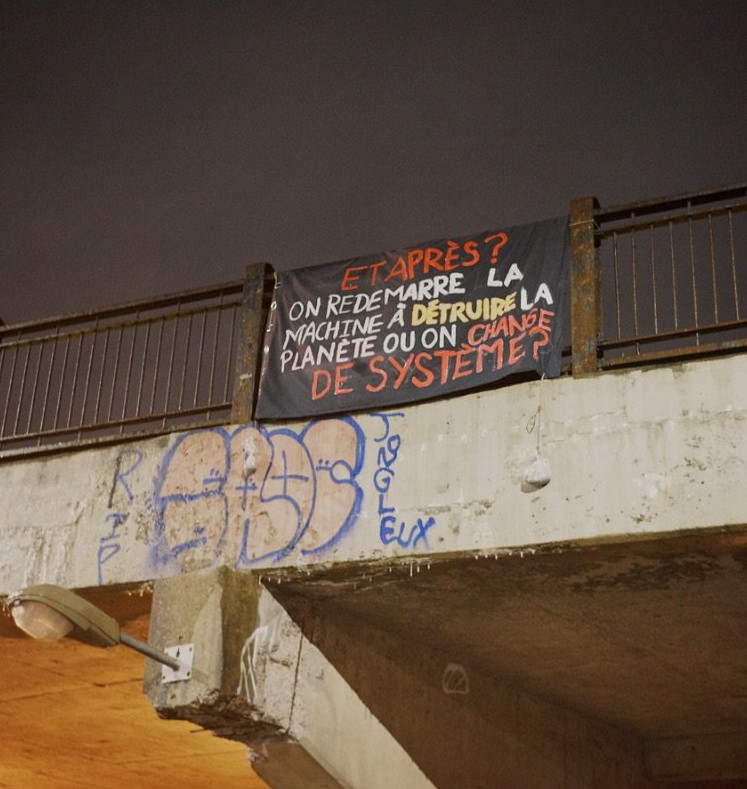Ecological Struggles / Luttes écologistes
GREENHOUSE GAS AND PIPELINES
GREENHOUSE GAS AND PIPELINES
The current wave of construction is occurring at a time of particularly high gas prices. Oil sands and shale gas were long considered uneconomic to extract. This is the vicious circle of extractivism: the more resources are extracted, the more scarce they become, which in turn drives up prices and makes it more profitable to extract, even while using inefficient techniques. Indeed, it is only with the turn of the century and the scarcity of oil resources that shale gas and oil sands have become economically viable to exploit.
AREN’T PIPELINES SAFER THAN TRAINS?
AREN’T PIPELINES SAFER THAN TRAINS?
One might think that pipelines are safer than other ways of transporting these fuels. The value of human lives cannot be quantified, but for the Lac-Mégantic tragedy, the Quebec government requests nearly $400 million from the railway company. Of course, the insurance owned by the railroad company responsible for this section only covered up to 25 million in damages and therefore it went bankrupt. These same dynamics, where insurance premiums are requested by governments for risky projects, are also present in the pipeline.
THE FIGHT FOR ADA’ITSX (FAIRY CREEK)
THE FIGHT FOR ADA’ITSX (FAIRY CREEK)
The area known as Ada’itsx, better known as Fairy Creek, is located near the southwest coast of Vancouver Island, about a two-hour drive from Victoria. Originally composed of the watershed of the creek of the same name, the area has come to encompass a collection of pristine forests in the region. The originally defended watershed is in Pacheedaht territory, but the area now touches a larger forest complex, including Ditidaht territory [1]
Call for an Anticapitalist Contingent at the Global Climate Strike March of September 24th
Call for an Anticapitalist Contingent at the Global Climate Strike March of September 24th

Another big protest for climate, what's the point?
Of course it'll be nice to have as many people as there was in 2019, but in the end, even Greta couldn't make our governments change their policies. Well, ok, it falls a few days after the federal election, and we can hope that it can put some pressure on the bewly elected officials... But we know it won't: whoever is in power after the elections, nothing significant will be done, nothing significant has ever been done for climate in so-called Canada. Since the beginning of colonization, the State steals, exploits and destroys the land on which we live and which, ironically, ensure our survival.
Non à la relance destructrice: ateliers de réflexion sur le développement capitaliste et colonial
Non à la relance destructrice: ateliers de réflexion sur le développement capitaliste et colonial
 Les ateliers se tiendront un samedi sur deux, a partir de la mi-juillet, à 19h dans la cour du DIRA (2035 Saint-Laurent):
17 juillet : Historique du rôle des infrastructures de transport et de communication dans le projet capitaliste colonial québécois
31 juillet : Réaménagement du territoire en cours et à venir : la stratégie maritime du Québec
14 aout : Résistances à la réorganisation urbaine, stratégies et pratiques
Les ateliers se tiendront un samedi sur deux, a partir de la mi-juillet, à 19h dans la cour du DIRA (2035 Saint-Laurent):
17 juillet : Historique du rôle des infrastructures de transport et de communication dans le projet capitaliste colonial québécois
31 juillet : Réaménagement du territoire en cours et à venir : la stratégie maritime du Québec
14 aout : Résistances à la réorganisation urbaine, stratégies et pratiques
Event Teach-ins/Conférences
Post-MayDay communiqué: In action despite being confined!
Post-MayDay communiqué: In action despite being confined!

This past MayDay, like each year for over a century, was the International Workers' Day. Despite being confined, many people took action to redecorate the city. The situation might seem grim, but there are still a few positive observations we can make.
The air in our city is clearer that it has been for over a century. Oil consumption slows down and greenhouse gases production diminishes. For many people, being confined is an opportunity to review our unhealthy relationship with work within an hyperperformist and hyperproductivist society.
Ecofascism 101
Ecofascism 101

Ecofascism is an ideology that merges neo-fascism with environmentalism. Ecofascists share many of the same concerns as radical leftist environmentalists in that they want to protect the Earth, as well as animals, from the ecological destruction that has been brought on by capitalism. Where they differ, of course, is that ecofascists aim to do so through tactics that spawn from racist and white supremacist principles.
Ecological intersectionality
Ecological intersectionality

This text was originally written in French
Intersectionality is mentioned in about all of social science literature nowadays. Typically, this concept shows the interdependent relation between generic situations and how different domination systems can overlap. Intersectionality is however, as it presents itself historically, an analytical tool developed especially with the aim to build an understandable holistic view of the critics of capitalism, patriarchy and racism. It is why this concept is so important for environmental struggles.
Racism and capitalist development
Racism and capitalist development

This text was originally written in French
Racialized people are victims of many forms of discrimination. For instance, during the 2016 census, the income of people reported as belonging to visible minorities was 30% lower than white people. Another example is the fact that polluting factories and city dumps are often found on land populated by Indigenous and racialized people. One may assume that capitalist developments simply prefer territory inhabited by poorer people, but wealth does not explain what is seen in the field. In practice, capitalist developments are often used as a pretext to enforce racist ideology. [1]
Green Capitalism: Following the Path of Imperialism
Green Capitalism: Following the Path of Imperialism
This text was originally written in French
During the latest September 27th climate demonstration, an irritated voice could be heard over the crowd saying: “Can we avoid mixing everything and just do a demonstration for the environment, without mentioning capitalism?”
Who pollutes when Canada and the United-States pollute less?
Who pollutes when Canada and the United-States pollute less?
From the start, the Paris Conference aimed to take the year 1990 as a reference for greenhouse gas (GHG) reduction. 1990 seemed like a critical point for many international observers, since it was a pivotal year for the world economy: it marked the increasing trend in factory delocalization toward countries like China, India or Mexico.
Eco glossary
Eco glossary
Biodiversity: The diversity of life and species living in a given ecosystem. Biodiversity is important for ecological resilience in the face of environmental changes. For instance, if a season is longer than usual, a species already in place, which thrives under these new conditions, will be able to compensate for the population reduction of other species which are not adapted to this change. Unfortunately, the planet’s biodiversity has radically diminished in the last few decades.
When the Internet is Slow: a Short History of Transportation
When the Internet is Slow: a Short History of Transportation
The perception that our consumption is abnormal is always based on comparisons between ourselves and people around us. However, consumption of goods, products and services depends first on transport and communication infrastructures. These infrastructures were built through the spending of billions of dollars each year, each time by stepping on local communities and ecosystems. It is therefore important to think about the colonization steps of the territory in order to put our consumption into context.
Journal Article Heatstroke! (2020)
To the anti-anti-speciesist left
To the anti-anti-speciesist left
When we restrain from buying on Amazon for a mere five-day strike, it isn’t necessarily because we think our boycott will end capitalism or that our consumer behavior will save the planet. Anti-speciesists don’t necessarily see veganism that way either. However, of all reactionary positions defended by people who call themselves leftists, anti-anti-speciesism is one of the most unceasing.
